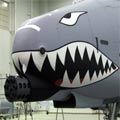| Author |
Message |
 |
|
|
 |
|
Advert
|
Forum adverts like this one are shown to any user who is not logged in. Join us by filling out a tiny 3 field form and you will get your own, free, dakka user account which gives a good range of benefits to you:
- No adverts like this in the forums anymore.
- Times and dates in your local timezone.
- Full tracking of what you have read so you can skip to your first unread post, easily see what has changed since you last logged in, and easily see what is new at a glance.
- Email notifications for threads you want to watch closely.
- Being a part of the oldest wargaming community on the net.
If you are already a member then feel free to login now. |
|
 |
![[Post New]](/s/i/i.gif) 2014/09/05 16:12:49
Subject: Re:Ebola!
|
 |

Decrepit Dakkanaut
|
Pre Apoc...
|
Proud Member of the Infidels of OIF/OEF
No longer defending the US Military or US Gov't. Just going to ""**feed into your fears**"" with Duffel Blog 
Did not fight my way up on top the food chain to become a Vegan...
Warning: Stupid Allergy
Once you pull the pin, Mr. Grenade is no longer your friend
DE 6700
Harlequin 2500
RIP Muhammad Ali.
Jihadin, Scorched Earth 791. Leader of the Pork Eating Crusader. Alpha
|
|
|
 |
 |
![[Post New]](/s/i/i.gif) 2014/09/20 14:47:25
Subject: Re:Ebola!
|
 |

Last Remaining Whole C'Tan
|
There was an article that laid out the case for US intervention in Africa to assist with combating the Ebola outbreak.
Why Obama’s Plan to Fight Ebola Might Actually Work
by Jeffrey E. Stern
It’s too soon to tell whether President Barack Obama’s decision to dispatch troops to West Africa to assist in the fight against Ebola—an announcement squeezed in just before his big ISIS policy offensive—is the right intervention at the right time. I believe it is, for several reasons, but there are some very real pitfalls that U.S. personnel must avoid in order for their presence to be constructive rather than inflammatory.
Let’s get one thing out of the way—the matter of justification. Many, maybe most, Americans don’t need to be sold on the idea—the humanitarian grounds are obvious and compelling. But there will always be some who will raise an eyebrow, and to them I’d make a couple of selfish real-world points.
First, U.S. action comes with attendant, secondary benefits that might not be immediately obvious: the U.S. military gets a chance to confront an infectious agent in a real-world scenario, in which responding means not just managing the biological aspect of an outbreak but also the cultural, social, and economic ones too. Infectious agents are the boogeymen we’ve all been worried about since the modern age of terrorism began. Few of our government agencies have any real experience with the problems that surround the outbreak of a virulent contagion: a potentially uncooperative population, a sputtering economy, social disequilibrium as families are decimated. These are things that happen when a community is stricken with a scourge that is deadly, invisible, and, to many, inexplicable, and it behooves us to know how to deal with them. So, even if you approach the deployment without a shred of altruism, it makes good practical sense.
It also makes practical sense because, as Obama was right to point out, the outbreak in West Africa threatens international security. Not for epidemiological reasons—the likelihood of the outbreak spreading to the West is very low—but because the rot from degrading states spreads quickly. Economies suffer, people become frightened and restless, old tensions are inflamed, new ones arise. As we’ve seen, countries cancel visas, airlines cancel service, and commerce breaks down. Failed states are bad for everybody, and a few thousand troops might help provide stability.
There are, of course, considerable risks associated with dropping 3,000 military personal into the hot zone. First, the virus thrives on fear and misinformation. It’s very likely we would not be where we are today had there not been large population pockets that were not cooperating with authorities, and in some cases violently resisting them. Infected people hiding allowed the virus to spread unseen. Consider that, in many villages, the word “Ebola” arrived for the first time after the teams of foreign men in big yellow Tyvek suits arrived in villages to take father or grandmother into isolation. It was a frightening sight, and “we are here to help” was not necessarily the most credible message. Nor would it be for you: if you came home to see a team of men in space suits going into a neighbor’s house in Berkeley or on the Upper West Side, you too might be frightened, disoriented, and inclined to hide.
And the response to people hiding was, if well-intentioned, still tone-deaf. The president of Liberia instituted a new law making it a crime to hide infected Ebola patients. The law sought to address a phenomena that needed to be corrected, but did it in the wrong way—one that, I’d argue, exacerbated the problem by further pitting government against population. Fear tends to beget fear, and more than anything else, in the case of an outbreak, causes people to act irrationally and unhelpfully. You need people to want the government’s help, not be compelled to accept it.
We’ve yet to learn what the components of a U.S. military presence are going to be—it may consist mostly of medical staff. But we’d be well served to keep in mind that few things say, “We’re here to help,” less effectively than a few thousand uniformed people holding guns. The natural reaction when you encounter a foreign army in your neighborhood is to assume that they’re there to impose their will, and to wonder if their will corresponds to yours.
We need to remember that as much as the Ebola outbreak is a public-health crisis, it’s rooted in a public-communication crisis. One of the things that has been forgotten as the virus has spiraled out of control is that, initially, the medical response was effective. Of late, Doctors Without Borders has been running around to any international forum where people will listen, affecting open bewilderment that a few small organizations are expected to handle such a widespread outbreak—and (rightly) scorning the rest of us for doing so little. But the reality is that, to their credit, for a few months they did handle it, along with the World Health Organization, the International Committee of the Red Cross, the Centers for Disease Control, and others. The Doctors Without Borders treatment center in the capitol of Guinea was saving 65 percent of Ebola patients who came in, which can only be considered a remarkable success given that the virus is supposed to kill almost 90 percent of its victims.
The problem, at first, was not in the medical response; it was in the messaging. Medical organizations can only help people who are willing to receive help, and too many people weren’t—whether because they believed Ebola was a curse rather than a virus, or because they weren’t given the right information about the disease, or because they were disoriented by the teams of international health workers that had descended on their community so suddenly.
Our troops risk exacerbating this situation, adding to the idea that the international response is something to be afraid of. And, if their mission is going to be containment or quarantine, I’d caution them against it. It won’t work. The borders are too big and too porous, and people are too far gone down the road of conspiratorial thinking. We’re long past the point where physical containment or outright coercion is likely to be successful.
Fortunately (or perhaps, unfortunately) our military has experience working amid civilian populations, albeit with varying degrees of success. I’ve seen this firsthand, having spent time around the U.S. military in non-combat roles in Afghanistan, another theater where an unseen threat lurks around every corner.
I’m optimistic that the mission can be successful, if people are well prepared and the dangerous pitfalls can be avoided. I’m optimistic for one main reason.
There have been a few dominant narratives in the coverage of the Ebola outbreak to date, and to the extent that media narratives are reflective of actual trends, there’s something worth taking note of. A month or two ago, most of the salient pieces of reporting had to do with the violent resistance to the medical effort: villagers throwing rocks at health workers; people breaking into a treatment center in Monrovia and “freeing” the patients. Today, many of the stories have taken a more tragic tone, highlighting the long lines of people who can’t get treatment and the lack of sufficient medical supplies to meet demand.
In tragedy lies opportunity. A lot of people are now seeking medical care. Maybe that’s just because more people are sick. Maybe it has nothing to do with more people understanding that it’s good both for you, the infected patient, and your family for you to go to a treatment center. But even if there has been no change in public understanding, there are a lot more people who fit two criteria: One, they need care. And two, they are open to receiving it.
It may be that Obama’s intervention is not too little too late. Indeed, it may be that any sooner would have been too soon.
And another for what the intervention will look like:
US says no Ebola patient contact for troops in Liberia
AFP
Washington (AFP) - US troops heading to Liberia to help fight the Ebola epidemic will help train health workers but will have no "direct contact" with patients infected with the virus, the Pentagon said Friday.
The 3,000-strong contingent due to deploy to Liberia will be focused on training health workers in the country and setting up facilities to help West African countries tackle the crisis, spokesman Rear Admiral John Kirby told a news conference.
The troops will carry protective gear but "there's no intent right now for them to have direct contact with patients," Kirby said.
The first US military cargo plane arrived in Monrovia on Thursday as part of the US effort to help fight the epidemic, he said, after President Barack Obama this week issued an appeal for urgent international action.
"Right now, the effort does not include US military personnel treating Ebola patients," Kirby said. "We're going to be in support of other health care workers that are experts at doing this."
Kirby said a C-17 aircraft with equipment and seven service members landed on Thursday, with two more cargo planes expected this weekend in Monrovia carrying 45 personnel.
The small team will then set up a headquarters for Major General Darryl Williams, who will oversee the US mission to train local health workers and establish additional medical facilities, he said.
Military engineers are due to build new Ebola treatment centers in affected areas, the Obama administration said this week, while US officials would help recruit medical personnel to work at the units.
The State Department meanwhile said it supported the steps being taken by Sierra Leone to halt the spread of the disease by imposing a three-day nationwide shut-down.
"We are pleased to hear that the campaign is proceeding calmly and that the people of Sierra Leone are overwhelming cooperating by staying at home and engaging with the outreach teams," a State Department official told AFP, adding the US embassy had been closed to comply with the campaign.
The Pentagon has spent $30 million so far to help provide a field hospital and other equipment and has requested up to one billion dollars from Congress to combat the outbreak, which would require shifting funds from other department programs, according to Kirby.
Obama unveiled the troop deployment to West Africa earlier this week, issuing an international call to action to prevent the virus from spreading "exponentially."
Liberian President Ellen Johnson Sirleaf has welcomed the US mission and said she hoped Washington's move would prompt other countries to provide more support to address the epidemic, which has killed more than 2,600 people in Guinea, Liberia, Nigeria and Sierra Leone this year.
The UN Security Council has called the virus a threat to world peace.
The virus can kill victims within days, causing severe fever and muscle pain, weakness, vomiting and diarrhea -- in some cases shutting down organs and causing unstoppable bleeding.
|
|
This message was edited 1 time. Last update was at 2014/09/20 14:47:45
 lord_blackfang wrote: lord_blackfang wrote:Respect to the guy who subscribed just to post a massive ASCII dong in the chat and immediately get banned.
 Flinty wrote: Flinty wrote:The benefit of slate is that its.actually a.rock with rock like properties. The downside is that it's a rock
|
|
|
 |
 |
![[Post New]](/s/i/i.gif) 2014/09/20 15:05:15
Subject: Re:Ebola!
|
 |

Blood Angel Captain Wracked with Visions
|
 Ouze wrote:There was an article Ouze wrote:There was an article that laid out the case for US intervention in Africa to assist with combating the Ebola outbreak.
Why Obama’s Plan to Fight Ebola Might Actually Work
by Jeffrey E. Stern
. . .Failed states are bad for everybody, and a few thousand troops might help provide stability.
I agree. Lets start by putting them on our southern border where they are more likely to directly benefit the US, and without the cost and logistics of supplying them overseas.
|
|
|
|
 |
 |
![[Post New]](/s/i/i.gif) 2014/09/20 15:12:36
Subject: Ebola!
|
 |

Avatar of the Bloody-Handed God
Inside your mind, corrupting the pathways
|
There are more than enough American soldiers, and more than enough money in the military budget to do both, surely? 
|
|
|
|
 |
 |
![[Post New]](/s/i/i.gif) 2014/09/20 15:32:17
Subject: Ebola!
|
 |

Blood Angel Captain Wracked with Visions
|
 SilverMK2 wrote: SilverMK2 wrote:There are more than enough American soldiers, and more than enough money in the military budget to do both, surely? 
Only if you actually want to stem illegal immigration and not distort the voting demographics in your favour by allowing a voting bloc to import themselves (taxpayer subsidized of course)
|
|
|
|
 |
 |
![[Post New]](/s/i/i.gif) 2014/09/20 15:46:04
Subject: Ebola!
|
 |

Fixture of Dakka
|
That second article in the OT is pretty hard to believe.
|
|
|
 |
 |
|
|
|